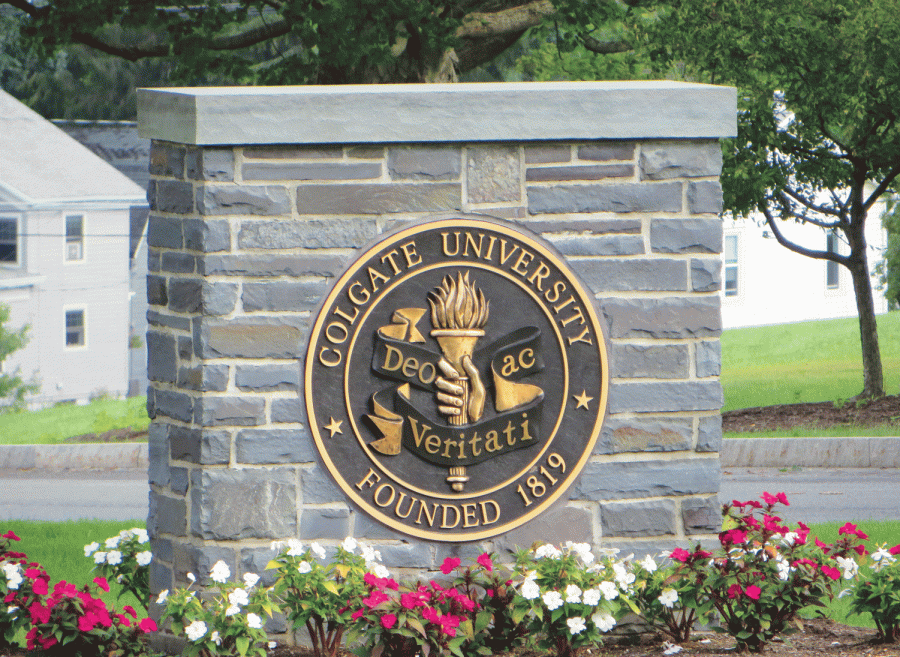Colgate Eliminates Torches from Convocation in Light of Charlottesville
Colgate’s emblem, displayed on this sign, incorporates the currently controversial torch symbol. This year Colgate is rethinking the ceremonial role of the symbol.
The processional torches did not appear at the Founders’ Day Convocation on Monday, August 28, and will be reconsidered as a community symbol of the “torch of knowledge” due to their use in the recent protests in Charlottesville, Virginia. The decision not to feature the torches was announced to the Colgate community by President Brian Casey via email.
The torch tradition was removed from the program primarily out of respect for the people suffering in Charlottesville and the current connotation of torches on a college campus.
Though the Torchlight and Founders’ Day traditions have split the community for many years, this adjustment in rituals was directly prompted by violence in Charlottesville on August 12, when white nationalist and right-wing groups marched at the University of Virginia with torches the night before a scheduled “Unite the Right” rally.
The rally itself, which took place in Emancipation Park, included imagery of the Ku Klux Klan (KKK) and neo-Nazism. Violence broke out between groups of counter protesters and “Unite the Right” attendees, resulting in one death and 19 injuries after a lone driver drove his car into the crowd, according to Vox News.
Casey believes the violence in Virginia was particularly alarming to the Colgate community because of the specific use of a torch as a symbol of hate and the involvement of a college campus.
“So much of what we saw in Charlottesville from neo-Nazi, KKK and other white supremacist groups can be attributed to ignorance and fear,” Casey said in an email to faculty, staff and students on August 16. “Our academic mission demands that we reject this violent hatred.”
Vice President and Dean of Admission and Financial Aid Gary Ross feels the tradition is more about what it represents for the incoming class.
“I think [it] signifies a very important transition in life [for first-year students]. I happen to think it signifies the fact that now, in a very real sense, people are going to start to be treated much more like adults. None of that will have changed from the very first Founders’ Day Convocation,” Ross said.
Although the Founders’ Day Convocation did not include the presence of torches this year, the status of the Torchlight tradition that occurs the night before Commencement remains undetermined.
Casey noted that the conversations on campus and social media surrounding Torchlight appeared intensely emotional and ineffective last year, so his priority became creating a space for students to discuss the issue and reimagine the tradition in a safe and productive manner.
A task force on free expression, consisting of faculty, staff and board members, had its first meeting on Friday, August 25, and will soon expand to include members of the student body. The task force is loosely inspired by the University of Chicago’s “Statements on Principles of Free Expression” published in 2012. In addition, site-specific installation artist Barnaby Evans will serve as Colgate’s artist-in-residence to help the community alter existing and create new traditions on campus.
Casey explained that, while many members of the community are pleased with the decision to update traditions, some alumni have expressed sadness about the loss of a tradition. He thinks one reason the ritual is difficult to part with is because the neurological experience of holding fire is incredibly stimulating. The most common response Casey has received from members of the community, particularly those who are familiar with Evans’ Rhode Island installation “WaterFire,” is one of intrigue and willingness to change.
“When [alumni] remember the ritual, [they] remember it with great intensity. Which is also why the Ku Klux Klan used [fire]. They weren’t foolish, they took the most culturally resonant thing we do and took it. I want to take it back,” Casey said.
Contact Emily Rahhal at [email protected]
Emily Rahhal is a senior from Los Angeles, California double concentrating in Middle Eastern and Islamic Studies and Religion. She has previously worked...







